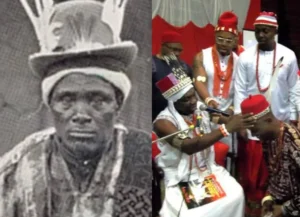Africa is known as the cradle of civilization. Our culture, our music, our way of life — they’re rich, deep, and full of meaning. But something is slowly disappearing right before our eyes: our traditional festivals.
These festivals were once the soul of many African communities. They brought families together, connected us with our ancestors, and gave our youth a sense of identity. But today, many of these beautiful festivals are being forgotten.
Go to most villages now and ask about the old festivals — you’ll hear stories like, “We used to celebrate it, but people don’t do it anymore.” Some were stopped because of religion. Others faded due to modern lifestyle and lack of interest.
Even in my own village, the Mbom Ama Festival that used to bring people out in beautiful costumes is now a shadow of itself. Some years, it doesn’t even hold. And when it does, it lacks the energy and spirit it once had. The senior men who used to lead it have either passed away or are too old to participate.
This is not just happening in one place. From Nigeria to Ghana, Sudan to Uganda, traditional festivals are fading across Africa.
But before we talk about why, let’s first understand what these festivals truly mean.
What Are African Traditional Festivals?
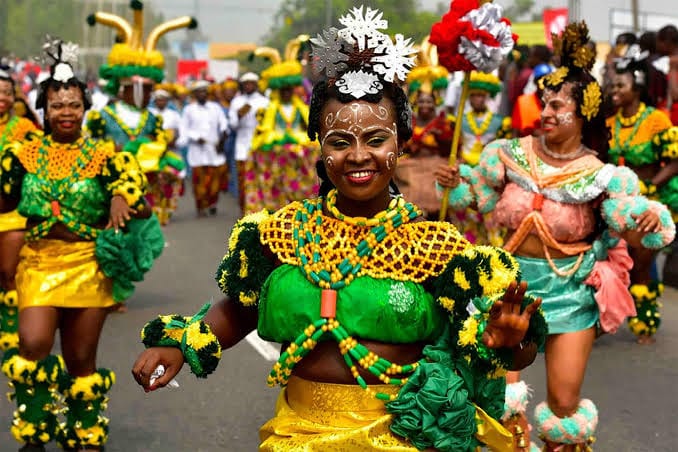
Traditional festivals in Africa are not like your regular party or end-of-year gathering. These festivals carry deep meaning. They are rooted in the beliefs, customs, and history of our people.
They often involve:
- Rituals to honour deities or ancestors
- Music, drumming, and traditional dance
- Storytelling by elders
- Wearing cultural attire
- Feasting and community celebration
For example, the Egungun Festival among the Yoruba people is not just for entertainment. It’s a spiritual event where masked dancers represent the spirits of ancestors. They come out to bless the living, warn wrongdoers, and connect the past with the present.
Same way the Imbalu Festival in Uganda is not just about circumcision. It marks a boy’s journey into manhood. It’s a rite of passage that builds courage, respect, and identity among the Bagisu people.
These festivals help preserve our history, pass knowledge to the next generation, and teach community values. Unfortunately, many of them are now “endangered” — just like some of our native languages.
According to UNESCO, more than one-third of African intangible cultural practices, including festivals, are at risk of disappearing due to lack of preservation.
Why Are These Festivals Being Forgotten?
Let’s be real. A lot of factors are responsible. Some we can control, some we can’t.
1. Urban Migration
These festivals mostly take place in rural areas. But nowadays, many young people have moved to the cities — Abuja, Lagos, Accra, Nairobi — to hustle. There’s no time to go home for festivals.
Sometimes, they don’t even know when it’s happening. And let’s be honest, some just don’t care anymore. They’d rather spend December at a beach party than attend their village masquerade festival.
2. Foreign Religions and Beliefs
This one is very common. Christianity and Islam have grown so much in Africa that many now see traditional festivals as “idol worship.”
Pastors even preach against it. Imams call them haram. So people start avoiding these festivals for fear of being seen as “ungodly.” Over time, the entire community may stop celebrating it altogether.
3. Technology and Modern Lifestyle
Back in the day, elders used to sit children down to explain the meaning of these festivals. Now? Everyone is busy scrolling on their phones or binge-watching Netflix.
Even when a festival is happening, people are more focused on recording it for TikTok than understanding what it means. The spiritual and cultural depth is lost.
4. Lack of Documentation
Most of our festivals were passed down orally. If the elders die without passing the stories to the younger ones, it’s over. Nobody wrote them down. No proper record, no archive, nothing.
So now, many young people only hear “we used to…” but don’t even know what “used to” means.
A Real Example: Egungun Festival Turning Violent
According to the Ibadan Journal of Sociology, the famous Egungun Festival in Nigeria, once a peaceful and spiritual event, is now known for violence in some towns. Fights break out, sometimes even resulting in injuries or deaths.
Now ask yourself — if you’re a tourist or a parent, would you want your children near such an event?
This is one of the reasons why some festivals are dying. When security is no longer guaranteed, both locals and visitors will stop showing up.
What We’re Losing
When a festival dies, we’re not just losing an event. We’re losing:
- A connection to our ancestors
- A way to teach our children about their roots (storytelling)
- A source of unity in our communities
- A tourism and economic opportunity
Some of these festivals — if preserved — could attract global attention. People travel all the way to Brazil and India to witness cultural events. Why not Africa?
According to the UN World Tourism Organization, cultural tourism is one of the fastest-growing travel sectors. That means our forgotten festivals could bring money, jobs, and exposure — if only we treat them as treasures.
Coming Up: We’ll dive deeper into specific festivals that are fading — like Aboakyir in Ghana, Imbalu in Uganda, and Nkwa Umuagbogho in Southeastern Nigeria. We’ll explore their meaning, how they’ve changed, and what makes them worth saving.
Quick FAQ
Q: What are African traditional festivals?
A: They are cultural events that celebrate ancestral spirits, deities, harvests, or rites of passage through music, dance, rituals, and community gathering.
Q: Why are African festivals disappearing?
A: Due to urban migration, influence of foreign religions, modern lifestyle, and lack of documentation.
Q: Are these festivals still relevant today?
A: Yes. They connect us to our roots, promote unity, and have the potential to boost tourism and local economies.
Forgotten African Traditional Festivals – Stories We’re Losing
Now that we understand why African traditional festivals are fading, let’s look at some actual festivals that once meant so much to their people — but are now either forgotten or hanging by a thread.
These are not just events. Each one carries deep spiritual, cultural, and historical meaning. But sadly, many are now fighting to stay alive.
Aboakyir Festival – Ghana
The Aboakyir Festival is one of the oldest and most spiritual festivals of the Effutu people in Winneba, Ghana. It used to be a big deal. Every year, people would gather to witness two rival groups go into the forest to catch a live deer with their bare hands.
Yes — no guns, no traps. Just pure traditional hunting skills passed down from ancestors.
What’s the Meaning?
Aboakyir means “hunting for the animal.” The festival was created to honor the god Penkye Otu, who used to demand human sacrifices. But the people later pleaded and agreed to offer a live deer instead — a huge moral and spiritual breakthrough at the time.
Why It’s Fading
These days, many Ghanaians — especially youths — don’t even know when the Aboakyir Festival is held. In 2023, local news reports said attendance was the lowest in 10 years.
According to Ghana’s Ministry of Tourism and Culture, over 60% of the country’s smaller indigenous festivals are no longer active.
Some people see it as outdated. Others complain about poor organization, lack of funding, or simply not feeling connected anymore. Without documentation or digital promotion, Aboakyir could become history.
Why It Matters
- Preserves traditional hunting practices
- Replaces human sacrifice with a peaceful ritual
- Encourages unity among rival clans
- Boosts tourism in Winneba
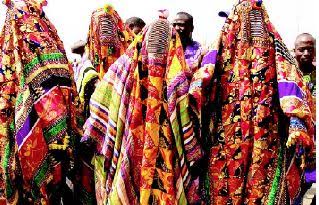
Egungun Festival – Nigeria
The Egungun Festival is one of the most famous Yoruba traditional celebrations. It involves masked dancers known as Egungun — believed to be the spirits of the dead returning to bless, warn, or punish the living.
These spirits wear colorful, elaborate costumes and dance to heavy drumming, moving through towns in spiritual processions.
What’s the Meaning?
Egungun means “ancestral masquerade.” The festival connects the living with the dead, reminds people of moral conduct, and strengthens the Yoruba belief in reincarnation and ancestral presence.
But today? The same festival that was once respected is now facing big problems.
Why we think It’s Fading
According to the Ibadan Journal of Sociology, the Egungun Festival is increasingly becoming known for violence, gang clashes, and political manipulation.
That’s not what Egungun is about. Once the community loses trust in the festival’s purpose, participation drops. Tourists stay away. Even locals begin to avoid it.
Why It Matters
- Keeps ancestral reverence alive
- Teaches morality and communal values
- Rich in music, arts, and oral tradition
- Boosts local economy during celebration period
Imbalu Festival – Uganda
In Eastern Uganda, among the Bagisu people, there’s a powerful initiation ceremony known as the Imbalu Festival.
Young boys between 16 and 20 years old undergo public circumcision, marking their transition into adulthood. The ceremony is surrounded by drumming, dancing, and intense singing from family and well-wishers.
What’s the Meaning?
Imbalu is not just about the circumcision. It’s a rite of passage — a spiritual, social, and emotional transformation. Boys who go through it are respected as men in the community.
Why It’s Fading
Modern medicine, urban migration, and influence from foreign cultures have made many young people choose hospital procedures instead. Also, some parents now fear the public nature of the ritual, calling it “unsafe” or “old-fashioned.”
A 2019 report by Uganda’s Ministry of Culture revealed that Imbalu participation has dropped by over 30% in the last two decades.
Why It Matters
- Strengthens identity among Bagisu youth
- Promotes cultural unity and pride
- Provides a communal platform to teach discipline
- Attracts visitors from within and outside Uganda
Homowo Festival – Ghana
Homowo literally means “hooting at hunger.” It’s a harvest festival celebrated by the Ga people of Accra, Ghana.
The story behind it is powerful: long ago, the Ga suffered a terrible famine. When they finally survived and produced a good harvest, they danced, sang, and mocked the hunger that tried to finish them.
What’s the Meaning?
Homowo celebrates survival. It honors the ancestors and deities who helped the people during a time of extreme suffering.
Why It’s Fading
You’d think something this powerful would last forever, but urbanization is killing it. In modern Accra, many don’t even observe Homowo anymore. Younger Ga people see it as “village stuff.” Plus, there’s little promotion online.
Why It Matters
- Reminds people to be grateful
- Celebrates resilience and community strength
- Teaches food security and survival history
- Boosts community unity and identity
Shad Festival – Nubian Region (Egypt/Sudan)
Long before most modern African countries were born, the Nubian people had a festival called Shad to honor the Nile River — their source of life.
The Nile provided water, food, and transportation. So once a year, communities gathered for water rituals, offerings, and prayers for a good river season.
Why It’s Fading
Today, Shad is almost completely forgotten. Climate change, the building of dams, political crises in Sudan and Egypt, and displacement of Nubian communities have made the festival almost impossible to hold.
Why It Matters
- Raises environmental awareness
- Highlights the cultural connection to nature
- Reflects ancient African civilization
- Symbol of Nubian identity and spirituality
In the next part, we’ll shine a light on Nkwa Umuagbogho, a unique Igbo maiden festival, and other local festivals struggling for survival. We’ll also talk about personal stories — like what happened to the once-vibrant Mbom Ama.
We’ll explore how these festivals promote identity, virtue, and even small business opportunities.
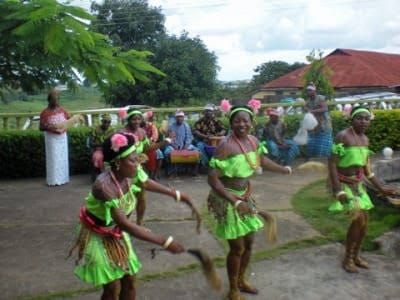
Nkwa Umuagbogho and Other Dying Local Festivals
While some African festivals like Aboakyir and Egungun still get attention in history books and cultural documentaries, there are many others that barely get mentioned — even by their own people.
Some of these are female-centered, seasonal, or village-specific festivals that meant so much back in the day but are now struggling to survive. Let’s talk about one of them.
Nkwa Umuagbogho Festival – Igbo Land, Nigeria
In Southeastern Nigeria, particularly among the Igbo people, there’s a beautiful traditional festival called Nkwa Umuagbogho. You probably haven’t heard of it unless you’re from a community where it used to be celebrated.
So, what is it about?
What’s the Meaning?
The name “Nkwa Umuagbogho” translates to Dance of the Maidens. It’s a festival where young, unmarried girls perform cultural dances dressed in traditional attire — waist beads, wrappers, beads on their necks, and sometimes white chalk on their faces.
It’s not just dancing for fun. It’s part of a rite of passage, a way to celebrate maidenhood and prepare the girls for womanhood and marriage.
These maidens are taught virtues like respect, discipline, hard work, and modesty. It’s also a time for families to showcase their daughters and for communities to bond.
Why It’s Fading
Sadly, festivals like Nkwa Umuagbogho are almost extinct now. You know why? Because today’s society now sees things like “virginity rites” or “maiden displays” as old-fashioned or even oppressive.
Some parents no longer want their daughters associated with it. Others just don’t see the need. The dresses are now seen as “bush,” and the dances don’t trend on Instagram or TikTok. So young girls are not interested.
Why It Matters
- It helps preserve Igbo music, dance, language, and dressing
- It promotes female discipline and pride in identity
- Encourages community bonding and respect for tradition
- Can support rural tourism and boost local businesses
Right now, only a few communities in Imo and Ebonyi states still try to hold this festival — and even they struggle to gather enough maidens who are willing to participate.
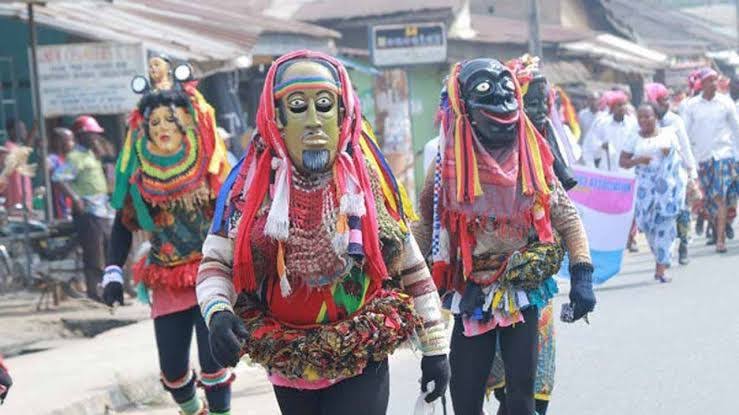
Mbom Ama Festival
Let me get personal here.
In my hometown, there used to be a powerful festival called Mbom Ama. I still remember how the older men would dress in costumes and dance through the town square, singing songs that carried wisdom and warnings.
They told stories — sometimes with drums, sometimes with chants. The children would gather, watching wide-eyed, learning indirectly what it meant to be a real man or woman in our community.
Now?
The festival still holds… sometimes. But it’s not the same. The vibe is gone. The older men that led it are no longer around. And the younger generation? They don’t even know what those songs mean. Some years, the celebration ends in fights and police intervention.
That’s how culture dies — slowly, then all at once.
Other Local Festivals We’re Losing
Here are a few more lesser-known African festivals that are fading into silence:
Oro Festival – Nigeria (Yoruba)
A male-only secretive festival meant to purify the town and remove evil spirits. Women are forbidden from witnessing it. Modern human rights campaigns and urban expansion have made it controversial and increasingly abandoned in urban areas.
Bakatue Festival – Ghana (Elmina)
Once used to mark the beginning of the fishing season, the Bakatue Festival is now mainly symbolic. Fishermen rarely observe the taboos that come with it anymore, and youth participation is dropping.
Gule Wamkulu – Malawi and Zambia
This is a sacred dance performed by the Chewa people, involving masked dancers representing spirits. It’s recognized by UNESCO, but it still faces decline because of Christian influences and modern youth disinterest.
Why These Local Festivals Matter
Most people only recognize the big, flashy festivals. But these small community-based festivals are the real backbone of African heritage.
They:
- Teach moral values
- Strengthen identity
- Keep language, music, and customs alive
- Unite families and villages
- Can be turned into rural tourism opportunities
In fact, a 2020 study by UNESCO revealed that over 300 local festivals in Sub-Saharan Africa are at risk of extinction due to lack of documentation and government support.
What’s the Way Forward?
We’ll get into that fully, but for now, just note this:
If we don’t start recording, sharing, and respecting our traditional festivals, we’ll lose them forever — along with everything they stood for.
And no, not everything old is bad. Some of these festivals are pure art, discipline, and storytelling. They just need a little rebranding, support, and a stronger voice in our modern world.
Next, We’ll talk about why these forgotten festivals still matter — not just as old traditions, but as tools for identity, unity, economic growth, and cultural pride. We’ll also explore their tourism potential and how they can fit into today’s digital world.
Why Forgotten Festivals Still Matter Today
A lot of people think traditional African festivals belong in the past. Some see them as “fetish.” Others just call them “village things.” But if we really sit down and think, these festivals carry serious weight — culturally, emotionally, and even financially.
We’re not saying every traditional practice must be followed blindly. No. But we can’t throw away the whole pot just because of one bad yam.
Let’s break it down.
1. They Preserve African Heritage
Every festival tells a story — of our ancestors, of survival, of belief, of how we lived before colonization and modern religion.
When we abandon these festivals, we’re not just dropping an event. We’re erasing our history.
Imagine a Yoruba child who has never witnessed Egungun, or an Igbo teenager who doesn’t know what Nkwa Umuagbogho means. When these cultural events fade, so does the memory of our roots.
According to UNESCO, intangible heritage — which includes festivals — is key to maintaining cultural diversity in the face of growing globalization.
And they’re right. Because without our heritage, we become copycats — always borrowing from the West, never knowing who we truly are.
2. They Strengthen Cultural Identity
Let’s face it: a lot of African youth today are confused about their identity. They can sing more Drake songs than they know traditional proverbs from their own language.
But when you grow up seeing and participating in your community’s festival, it does something to your mind. It gives you a sense of pride. It tells you, “I belong somewhere.”
These festivals — from the Imbalu of Uganda to the Bakatue in Ghana — shape our worldview. They remind us that we are not lost, even if the world wants us to forget who we are.
3. They Promote Unity and Social Cohesion
You see, these festivals were not solo events. They brought families, villages, and sometimes entire ethnic groups together.
During Homowo, the Ga people share food with neighbours, sing together, and unite across class and clan. Same goes for Egungun, where entire towns line the streets in celebration — young and old, rich and poor.
In a country like Nigeria, where tribalism and division are still major issues, festivals are one of the few things that unite people naturally.
And it’s not just in rural places.
In 2023, the New Yam Festival in Enugu attracted Igbo people from all over the world. People traveled in from Canada, UK, and the US just to reconnect with their community.
4. They Have Tourism and Economic Potential
Now this one is serious.
African festivals, if properly organized and promoted, can attract local and international tourists. Imagine if the Egungun Festival was packaged well, with proper security, branding, and promotion. Wouldn’t foreigners be flying in to see the colorful masquerades?
Take a look at Brazil’s Carnival or India’s Holi Festival. Those events are major tourism earners for their countries.
So why can’t our festivals do the same?
In 2022, the World Tourism Organization (UNWTO) reported that cultural tourism accounted for over 40% of all global tourism revenue.
Even in Ghana, the Year of Return 2019 campaign brought in over $1.9 billion, according to the Ghana Tourism Authority — and a lot of that was spent attending festivals and cultural events.
So if we invest in our forgotten festivals:
- Locals can sell food, drinks, crafts
- Artists can showcase their talent
- Transport and hospitality businesses make money
- Youth can get jobs as guides or performers
It becomes a full cultural economy.
5. They Promote Discipline, Education, and Morals
Many traditional festivals had values attached to them. They were not just about enjoyment.
For example:
- Nkwa Umuagbogho teaches maidens modesty, self-respect, and responsibility
- Imbalu trains boys to be strong, responsible men
- Oro Festival is about cleansing the land and upholding law and order
These festivals were schools of life. Elders used them to teach the next generation how to behave.
Modern society is fast losing that — and it shows.
6. They Keep Our Languages and Arts Alive
If you’ve ever attended a true traditional festival, you’ll hear native language, proverbs, chants, and local music in full swing.
It’s not like church or government events where everybody switches to English. No, here you’ll hear:
- Yoruba chants
- Igbo praise poetry
- Hausa drums
- Ga and Akan traditional hymns
And these help keep our languages from dying. They also help dancers, drummers, costume makers, and traditional historians stay relevant.
So, What’s the Bottom Line?
These festivals are not “bush things.” They are powerful cultural assets that can:
- Teach
- Heal
- Unite
- Generate income
- Preserve identity
- Build national pride
But the truth is: they can’t revive themselves.
In the next, we’ll talk about practical ways to revive these forgotten festivals — using education, technology, media, and even social media platforms.
How to Revive Forgotten African Traditional Festivals
So far, we’ve seen how powerful traditional festivals used to be — and how fast they’re fading. The good news? They can be brought back. Not just as “history” but as living, breathing parts of our culture.
We just need the right approach. And it starts with us — you, me, communities, governments, bloggers, and even the youth.
Let’s talk solutions.
1. Documentation is Key
One major reason these festivals are disappearing is because they were never properly recorded.
Many traditions were passed down orally from elder to child. But now, those elders are gone — and their knowledge went with them.
What can we do?
- Record oral stories from the few elders still alive
- Write down the origin, purpose, and rituals of each festival
- Take pictures and videos — real ones, not just TikToks
- Store this content in digital archives, websites, blogs, and libraries
For instance, the Centre for Black and African Arts and Civilization (CBAAC) in Nigeria has started archiving old African performances and festivals. Bloggers and students can partner with such institutions.
If we don’t document it, we can’t protect it.
2. Teach Children in Schools
Why should African children grow up knowing about Halloween and not Egungun or Nkwa Umuagbogho?
We need to bring our festivals into the classroom. Imagine a social studies class where students:
- Watch videos of local festivals
- Learn their historical roots
- Practice the music and dances
- Visit nearby cultural events
It’s already working in places like South Africa, where some schools observe Heritage Day by dressing in traditional attire and hosting mini-festivals on campus.
Ministries of education in African countries can revise curriculums to include:
- Local festival history
- Community storytelling
- Cultural presentation competitions
That way, we plant the seeds of pride early.
3. Leverage Social Media (The Smart Way)
Let’s be honest: the youth live on their phones. So instead of fighting it, let’s use it to revive culture.
Festivals need to go where the attention is:
- Instagram reels of traditional dances
- YouTube documentaries explaining forgotten rituals
- Facebook Live broadcasts of village festivals
- TikTok challenges with cultural songs or attire
- Threads and Twitter spaces discussing their value
In 2023, a short YouTube video of the Imbalu Festival in Uganda went viral and sparked fresh interest in the tradition — attracting tourists and researchers alike.
Even village youths with smartphones can document and upload their local festivals. Imagine hashtags like:
- #ReviveEgungun
- #ProudlyGa
- #BringBackBakatue
- #AfricanFestivalsMatter
A single viral post can bring a forgotten festival back to global attention.
4. Encourage Government Support
This part is crucial.
African governments often focus on oil, elections, and foreign trade — but forget that culture is soft power. Culture is identity. Culture is money.
Governments need to:
- Allocate annual budgets for cultural festivals
- Protect festival lands and sacred grounds from commercial takeover
- Organize national cultural weeks to showcase local traditions
- Give grants to cultural groups and town unions
For example, the Osun-Osogbo Festival in Nigeria now receives UNESCO backing and federal support — and it attracts thousands of visitors each year. That’s proof it works.
Imagine if smaller festivals like Mbom Ama or Oro got the same support?
5. Involve the Private Sector
Reviving festivals is not only a government job.
Private companies can:
- Sponsor festival events (MTN, Glo, banks, etc.)
- Provide logistics like canopies, sound systems, and media coverage
- Use festivals as platforms for CSR (Corporate Social Responsibility)
- Launch cultural tourism campaigns
Even small businesses like tailors, food vendors, event decorators, and bike riders benefit when festivals return. It boosts the entire local economy.
6. Make Festivals Youth-Friendly
Let’s be real: if something doesn’t “trend,” most youth won’t care.
So the strategy is simple — modernize without losing the message.
Ideas:
- Mix traditional music with Afrobeat during events
- Allow spoken word and storytelling competitions
- Add fashion shows with native wear
- Host community football matches as part of the festival
- Train youths as cultural ambassadors, vloggers, or digital archivists
This way, culture won’t feel boring or forced — it becomes fun and meaningful.
7. Use Blogs and Online Platforms
As a blogger, influencer, or content creator, you have the power to revive interest in African festivals.
You can:
- Write detailed posts about unknown festivals in your area
- Interview elders and cultural custodians
- Create image galleries with captions
- Post throwback festival pictures with stories
- Review festivals you’ve attended
Even if your blog has 50 readers, one of them may be someone in power — or a youth inspired to act.
If you need help, platforms like Google Arts & Culture are open to cultural contributions. UNESCO and African culture ministries also accept digital archiving proposals.
Real-Life Success Stories
- In Benin Republic, the revival of the Vodun Festival now draws tourists and researchers from around the world — boosting the local economy and pride.
- In Ethiopia, the Timket Festival (Epiphany) was recently listed by UNESCO, leading to more government investment and global exposure.
- In Ghana, the Chale Wote Street Art Festival cleverly blends old tradition with modern street art — and it attracts over 50,000 visitors yearly.
So it’s possible. We just need action, not pity.
We are the generation that can either rescue African traditional festivals or bury them completely.
The tools are in our hands:
- Smartphones
- Blogs
- Music
- Schools
- Churches and mosques (yes — some now support cultural integration)
- Community town halls
Let’s use these tools wisely. Because when the drum stops, the story ends.
Challenges in Reviving Forgotten African Festivals – And How to Overcome Them
So far, we’ve talked about what African festivals mean, why they’re fading, and how to bring them back. But let’s be honest — reviving traditional festivals is not beans. There are real issues holding us back.
If we don’t face these problems, all our revival efforts will just be vibes.
Let’s break them down one by one.
1. Lack of Interest Among Today’s Youth
Let’s not sugarcoat it — many young Africans don’t rate traditional festivals.
They see them as:
- Boring
- Fetish
- Not “packaged” enough
- Not TikTok-worthy
This mindset is dangerous because youth are the future of culture. If they don’t care, then nobody will.
What Can We Do?
- Repackage festivals in a fun and digital-friendly way
- Use music, dance, fashion, and gaming to blend old with new
- Let youth lead some parts of the planning — they’ll feel included
- Show them that culture can be cool
For example, Afrochella in Ghana is not an ancient festival, but it blends tradition and modern vibes so well that youth love it. We can do the same for our forgotten festivals.
2. Fear and Religious Bias
Some churches and mosques preach against traditional festivals, calling them “idolatry” or “demonic.” This has discouraged many families from participating in cultural events.
Yes, some festivals were tied to ancient deities, but many have evolved and now focus on heritage, values, and unity — not rituals.
What Can We Do?
- Educate religious leaders on the non-spiritual benefits of festivals
- Focus on the cultural and historical angles, not the spiritual
- Involve people of all faiths in neutral activities like dances, lectures, food displays, and costume exhibitions
A good example is how the Durbar Festival in Northern Nigeria is now celebrated openly by Muslims, even though it originated as a cultural event tied to war processions.
3. Urbanization and Migration
Many people now live in cities. The original villages where these festivals used to happen are either empty or filled with strangers who don’t care.
Worse, many of our towns are losing their cultural leaders to old age without replacements.
What Can We Do?
- Hold smaller “city versions” of the festivals in urban centers
- Encourage town unions and student groups to organize cultural days
- Use holidays and Christmas homecomings to revive village festivals
- Record and preserve stories of elders before they’re gone
If culture doesn’t move with the people, it will stay behind and die in silence.
4. Poor Funding
This one is tough. Organizing festivals takes money — for transport, costumes, musicians, food, security, and more. But many traditional communities don’t have the funds.
Without funding, festivals become dry. Nobody wants to attend an event that lacks energy or planning.
What Can We Do?
- Seek support from local businesses, influencers, and cultural organizations
- Ask state ministries of culture for small grants
- Open donation campaigns (GoFundMe, Paystack, Flutterwave)
- Get volunteers — students, NYSC members, and creatives who want to build a portfolio
Also, bloggers and media people like you can help by giving these festivals visibility. When brands see that people are talking about it, they may invest.
5. Insecurity and Violence
This one is real — and scary.
Some festivals (like Egungun and some masquerade parades) are now associated with violence, thuggery, and cult-related clashes. This scares away not just tourists but even locals.
What Can We Do?
- Work with local security teams and police for peaceful organization
- Clearly define festival rules and enforce discipline
- Publicly discourage violence and report bad elements
- Encourage peaceful, family-friendly events
Nobody wants to carry their child to a festival and meet flying bottles.
The Future of traditional festivals in Africa
African traditional festivals are not dead — but they’re on life support.
If we want to preserve our history, boost our tourism, unite our people, and celebrate who we are, then we must bring these festivals back — with style, purpose, and passion.
You don’t need to be a king or chief to make a difference. Start small:
- Document one forgotten festival in your area
- Interview your grandmother about old traditions
- Post throwbacks online
- Volunteer at your community’s next cultural event
- Write about it — just like this blog is doing
Because if we don’t tell our own stories, others will rewrite them — or forget them completely.
FAQs – Forgotten African Traditional Festivals
Q: What is the importance of African festivals in modern times?
A: African festivals preserve history, strengthen cultural identity, boost local tourism, and promote community values. They connect the past with the present and give young people a sense of belonging.
Q: Why are African traditional festivals fading away?
A: Many are disappearing due to urbanization, loss of interest, religious opposition, lack of funding, and poor documentation.
Q: How can we revive forgotten African traditional festivals?
A: We can revive them by documenting rituals, teaching children in schools, using social media, getting government and private support, and making festivals youth-friendly.
Q: What are some examples of forgotten African traditional festivals?
A: Examples include the Egungun Festival (Nigeria), Imbalu (Uganda), Nkwa Umuagbogho (Igbo), Aboakyir (Ghana), and the Shad Festival (Nubian region).
Q: How do African festivals affect the economy?
A: Well-organized festivals attract tourists, support small businesses, and create jobs in the creative and cultural sectors. Ghana’s Year of Return is one example of how festivals can boost national income.


